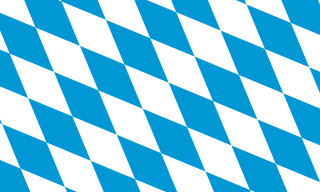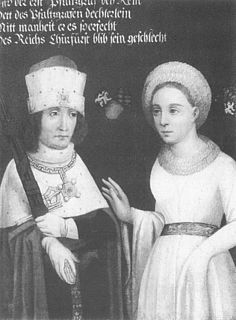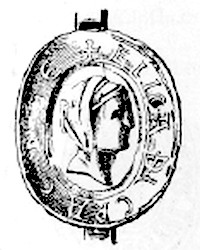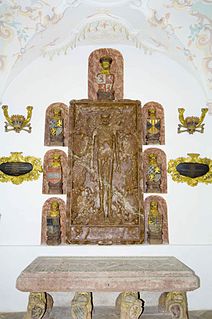
Rupert of the Palatinate, sometimes known as Robert of the Palatinate, a member of the House of Wittelsbach, was Elector Palatine from 1398 and King of Germany from 1400 until his death.

The Electoral Palatinate or the Palatinate (Pfalz), officially the Electorate of the Palatinate, was a country that was part of the Holy Roman Empire. Counts palatine of the Rhine served as prince-electors (Kurfürsten) from "time immemorial," were noted as such in a papal letter of 1261, and were confirmed as electors by the Golden Bull of 1356.

The House of Wittelsbach is a German dynasty, with branches that have ruled over territories including Bavaria, the Palatinate, Holland and Zeeland, Sweden, Hungary, Bohemia, the Electorate of Cologne and other prince-bishoprics, and Greece. Their ancestral lands of the Palatinate and Bavaria were Prince-electorates, as well as the Archbishopric-Electorate of Cologne, and the family had three of its members elected emperors and kings of the Holy Roman Empire. They ruled over the Kingdom of Bavaria which was created in 1805 and continued to exist until 1918.
A count palatine, also count of the palace or palsgrave, was originally an official attached to a royal or imperial palace or household and later a nobleman of a rank above that of an ordinary count. The title originated in the late Roman Empire. In the Middle Ages especially and into modern times, it is associated with the Holy Roman Empire.

The Duchy of Bavaria was a frontier region in the southeastern part of the Merovingian kingdom from the sixth through the eighth century. It was settled by Bavarian tribes and ruled by dukes (duces) under Frankish overlordship. A new duchy was created from this area during the decline of the Carolingian Empire in the late ninth century. It became one of the stem duchies of the East Frankish realm which evolved as the Kingdom of Germany and the Holy Roman Empire.
Otto II, called the Illustrious, was the Duke of Bavaria from 1231 and Count Palatine of the Rhine from 1214. He was the son of Louis I and Ludmilla of Bohemia and a member of the Wittelsbach dynasty.

Otto I, called the Redhead, was Duke of Bavaria from 1180 until his death. He was also called Otto VI as Count Palatine of Bavaria from 1156 to 1180. He was the first Bavarian ruler from the House of Wittelsbach, a dynasty which reigned until the abdication of King Ludwig III of Bavaria in the German Revolution of 1918.
Otto of Wittelsbach may refer to:

Palatinate-Neuburg was a territory of the Holy Roman Empire, founded in 1505 by a branch of the House of Wittelsbach. Its capital was Neuburg an der Donau. Its area was about 2,750 km², with a population of some 100,000.

Philip the Upright was an Elector Palatine of the Rhine from the house of Wittelsbach from 1476 to 1508.
The Luitpoldings were a medieval dynasty which ruled the German stem duchy of Bavaria from some time in the late ninth century off and on until 985.

Otto V, Count of Wittelsbach, also called Otto IV, Count of Scheyern, was the second son of Eckhard I, Count of Scheyern. Otto named himself Otto of Wittelsbach, after Wittelsbach Castle near Aichach. He served Henry V, Holy Roman Emperor, in his first Italian Expedition in 1110–1111. Emperor Henry V already addressed him as Otto Count of "Witlinesbac" in a document in 1115. From 1120 onwards, he was Count palatine of Bavaria.
Otto I (912–973), known as Otto the Great, was German king from 936 and Holy Roman Emperor from 962 to 973.

Agnes of the Palatinate (1201–1267) was a daughter of Henry V, Count Palatine of the Rhine and his first wife Agnes of Hohenstaufen, daughter of Conrad, Count Palatine of the Rhine. Agnes was Duchess of Bavaria by her marriage to Otto II Wittelsbach, Duke of Bavaria.
Elisabeth of Bavaria, or Elisabeth of Wittelsbach, may refer to:

Heilika of Pettendorf-Lengenfeld was by marriage Countess Palatine of Bavaria.
Otto II generally refers to Otto II, Holy Roman Emperor. It may also refer to:
Rupert of Palatinate-Mosbach was a German nobleman and clergyman. From 1457 to his death he was the forty-third bishop of Regensburg, as Rupert I.

John of Palatinate-Mosbach was a prince of the house of Wittelsbach and Dompropst or canon of Augsburg Cathedral and Regensburg Cathedral.
This page is based on this
Wikipedia article Text is available under the
CC BY-SA 4.0 license; additional terms may apply.
Images, videos and audio are available under their respective licenses.










